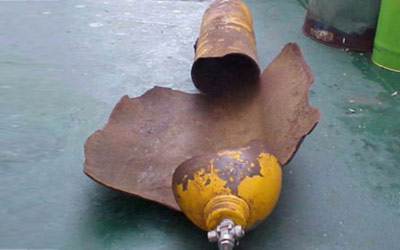Compressed Gas Safety
Compressed gas cylinders contain a great deal of energy. If the cylinders are mishandled or treated roughly, that energy can burst into an explosion – especially if the shut-off valve isn’t covered. If the cylinder ruptures or the valve breaks off, that pressure is released suddenly and destructively.
One more hazard of a compressed gas cylinder is that it may contain a highly flammable substance such as acetylene or it may contain oxygen that can cause a fire to accelerate out of control.

Many gases we work with present special dangers:
-
Toxic gases like Carbon Monoxide and Phosgene can be poisonous.
-
Many gases are flammable and can be ignited by sparks or other ignition sources.
-
Oxidizers, like Fluorine and Oxygen, can also cause fires and explosions.
-
Corrosives, such as Chlorine, can burn the skin and cause other damage.
- Some gases, such as Nitrogen and Helium, can push breathable air completely out of a room.
Things Not To Do:
-
Never roll a cylinder to move it.
-
Never carry a cylinder by the valve.
-
Never leave an open cylinder unattended.
-
Never leave a cylinder unsecured.
-
Never force improper attachments on to the wrong cylinder.
-
Never grease or oil the regulator, valve, or fittings of an oxygen cylinder.
-
Never refill a cylinder.
-
Never use a flame to locate gas leaks.
-
Never attempt to mix gases in a cylinder.
-
Never discard pressurized cylinders in the normal trash.
Make safety a reality…don’t be a fatality!!
Download flyer: STOTW_5_Compressed Gas Safety.pdf (102.26 kb)

